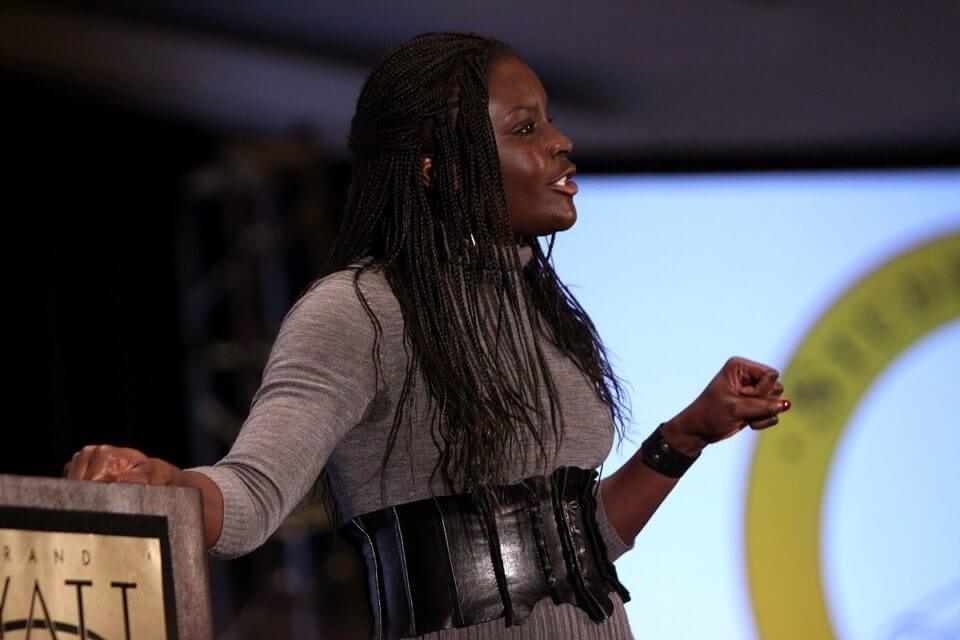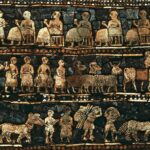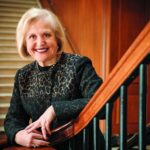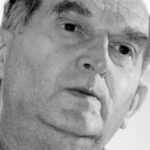
“Eventually, I had an emotional crisis because I could no longer reconcile the life of abundance that the U.S. afforded me. I made a pact with myself that from here on, I’m really going to try to see what needs to happen for [Africa] to thrive.”
On December 27th, entrepreneur and motivational speaker Magatte Wade sat down with Merion West and Andrew Scott to discuss her brand Skin Is Skin. Ms. Wade’s goal with the business is to lead Africa to prosperity through the free market. She believes the rejection of these ideas brought the majority of the continent to its current state of poverty. Ms. Wade speaks publicly about this to spread awareness and also works at the Atlas Network, a global network of free-market think tanks. This discussion chronicles Ms. Wade’s path to entrepreneurship, while also examining concrete ways people can help lift Africa out of poverty and how she’s working toward that future now.
Ms. Wade, thank you for joining me. What is a day in the life like for you with your work right now?
Today, I was working on two things. Payroll is coming up for the end of the month, so we always try to pay everyone a little earlier, especially when there are holidays. And then also on the school side, because we have a little school for the children of the workers, Montessori-type, and it just turned out that our kids right now are still going on both sides. They’re coming to our schools full-time when they don’t have school with the Senegalese system, and when the Senegalese school is in session, we have them full-time but on a different schedule. So we’re just making sure that we advance them. One of the kids, basically he’s top of his class, so we’re organizing to prepare a special gift for him, so today was all the fun stuff. But when you’re on two continents, sometimes you lose track of time.
So this is a youth program you have?
No, it’s a school where we have our own schedule and our own curriculum. It’s a French-speaking country, and it’s my firm belief that it’s hard to be part of a global economy if you don’t speak English. First of all, you have to understand we are in a village in a rural area. The traditional school system often has 50 to 60, sometimes 80, kids in one class. So kids are totally behind, and what we have found also is these are children from very modest backgrounds. Mom and dad are usually even illiterate themselves or left school after middle school. These kids are from households where their parents speak mostly Wolof, Pula, or Serer. We had to create some extra steps to help them bridge the gap between these two stages. For example, we’re currently teaching the kids to read in Wolof while speaking to them in French because when you read, you’re decoding language. And they must do it in a language they already understand because, otherwise, you have two unknowns, and it’s a bad equation. Once we have a grasp of that, then we also quickly include English. Then, the whole world starts to open up to them. We can get them involved in so many different programs, all types of things, like coding. The goal is really to have them be as capable as the best student anywhere else in the world, and it’s totally possible. They’re pulling their weight, and I’m very proud of them.
I don’t remember reading about this. When did you start doing this?
[Laughs.] Oftentimes, people ask me why I don’t talk about it. I think it’s been around for three or four years. I haven’t spoken about it yet because when you start something, everything is so crazy. When we started, we thought that kids 7-9 would be great for us because we thought they’d understand French. Then, we would have them leapfrog over to English because if you go on Duolingo, you can’t start as a Wolof speaker. We found that, “Oh my lord, the kids are totally behind.” Now, if you come from an elite background, it’s fine because your parents, first of all, speak French and are super well-educated themselves; they can provide you with tutors, and they’ll send you to private schools. But these kids, which is 80% of the kids in this situation, are a sacrificed generation. They will not be able to have a job in the next century. Both of their parents are still cobbling income left and right. I believe we’re going through the last generation of people who can just be day workers.
I think this is a very critical time we’re in, and I’m not sure many people see the disaster in the making here. If we use the power of technology and English, I can get them involved so much. We just finished our proof of concept phase, and now we’re working on the permanent spot of this school. Until recently, we rented a big house. Since COVID, that became my house, but now we’re ready to expand, and we are building to have a hundred kids to start. Quickly, we want to grow to 250. Until now, we never had more than 20 kids, but we had a lot to learn. Now, we think we’re ready to scale it up. You will probably be hearing much more about it as we do that, but thank you for allowing me to speak about it.
Of course. So, I was just wondering as we were talking about this, how do you select kids for this program?
All the kids want to be part of our school. The people who take care of the school always ask me if we can accept more kids. We’re starting with just the children of our workers because I’m also trying to prove a point. I’m a conscious capitalist at heart. My dream is for the continent to develop. I don’t want it to be like the Chinese model, where the development came at the expense of humans and the environment. You lift 800 million people out of poverty in such a short amount of time…Look, could it have been done better? Maybe.
We wanted a humane place. Everybody learns every step of the process so that people can rotate. We’re in countries where it doesn’t cost you much to educate children. So these parents now have the same perks as Google employees. They get a free school for their children on-premise, and they can go over to hug their child. It doesn’t have to be the same robotic way we’ve done before. People who have seen labs in France say our facility is so sparkling clean because we try to give people beauty.
In any case, I’m trying to criticize by creating and show the world that it doesn’t have to be expensive to give people good comfortable jobs working under humane conditions. It doesn’t take anything away from the quality of work. If somebody has a place to work and a place for their children to study, those are powerful anchors. We’re only changing the lives of the few people we’re involved with, but if we can inspire more, that’s when the tide of change rises. We’re just trying to tell people it’s possible and fun, so do it.
This might be a little out of order now, but I was going to initially start by asking about your background and how you came to start Skin is Skin.
I was born in Senegal. As soon as I finished breastfeeding, my parents moved to Europe for a better economic life. They left me behind to be raised by my grandma. After they felt the move was stable and durable, they decided to bring me with them. I was around seven. Back then, my parents were living in Germany. When I arrived, this one kind of obsessive question popped into my head: “How come they have all of this, and we don’t?” I think what I meant was, back home, when it’s time to shower, my grandma would have to boil some water in a pan and then put it in a bucket. Then somebody has to drag it to the shower. From there, with a little pot, I could finally take my shower. Here, my mom was like, “Time to shower,” and I was like, “Where is the bucket of warm water?” And she’s like, “Just jump in the shower, silly,” so I go in, and all I have to do is turn these knobs up and down. And you go to the grocery store, and everything is so neat, with all of these choices. Life just felt so comfortable, so easy. And I went to school, and my class was eight students for two teachers.
And the question eventually became: “How come some countries are poor, while other countries are rich?” I heard some people very seriously use the IQ theory and say, “Black and brown people are just not as smart as white people.” I heard people say, “It’s malnourishment.” I was like, “I don’t know. I know a lot of people who eat very well back home, and they’re still poor.” We have a joke back in Senegal that a graduate’s first job is a street seller. If I told you that street sellers going in between the cars had a Ph.D. in math or accounting, you’d be like, “what?”
[Laughs.] I am like that!
So my family decided to move to France. After business school, I decided to move to the U.S. because France was too small for my ambitions. I landed in Indiana, middle of nowhere. I was hired in the Midwest to be a business manager for a small family business in the automotive industry. After nine months, they said, “You totally outgrew what we hired you for.” Around that time, love called me to San Francisco. It was the heyday of the Dot-com boom. I was a headhunter in finance, working for companies like Google and Netflix when they were still tiny. But to live in that time in that place was to understand this concept of this magic of entrepreneurship. It was around that time that I think I got the bug of entrepreneurship.
Eventually, I had an emotional crisis because I could no longer reconcile the life of abundance that the U.S. afforded me. I made a pact with myself that from then on, I was really going to try to see what needs to happen for this continent to thrive. And I went back home to Senegal just to discover that this drink that I grew up with, which is part of my culture—it’s this hibiscus drink called the Juice of Turanga, the Juice of Hospitality—everybody who made it is drinking Coke, Fanta, Pepsi. And the people at the bottom of the pyramid, in an effort to show dignity or whatever, drink the knockoff products coming out of Iran, India, and Saudi Arabia. So in the middle, what happened was it squeezed out the women who grow the hibiscus.
So I started this company, Adina, and the plan was to bring back this hibiscus juice and to have it accepted in the West first; it would be like reverse colonialism. I knew nothing about entrepreneurship, but then we had the who’s who of the beverage industry. There’s usually a split between founders at that stage, and I was no exception. I had to walk away from my own company, but what I learned was already there.
Then, when my first husband passed away, my elders summoned me back home. The elders have such a way of caring. The first thing they said was, “It is such a pity that in the West, they lose sight of the fact that from the moment you’re born, you’re decisively walking towards death.” So they really retrain you on all of these very profound philosophies and then also go back to really letting you live at your own rhythm with a grief process but having guardrails around you, so it’s almost like this prepared environment but for grieving, right? That’s how I got to Skin is Skin.
I believe brands have this power to influence culture. Too often, they do it negatively. Our antidote to discrimination is this concept of curiosity, empathy, and love—and to create it, I went after the science of bias. For us, it’s about making sure people understand these mechanisms, so we created a tool to help them practice eliminating stereotypes, and that’s what we did with this lip balm. I believe business is the greatest force of good first and foremost because it gives people a job. Where do these jobs come from? They come from businesses. Don’t you think it would be a good idea to build a good environment for these businesses to be born and to run? It turns out there are many indexes that look at it, and my favorite one is the Doing Business Index Ranking of the World Bank. There’s another one I like called the Heritage Economic Freedom Index. Do you know what they found systematically? It is easier to do business anywhere in Scandinavia than almost anywhere in Sub-Saharan Africa. People who are anti-business think Scandinavia is a socialist utopia, but, on the economic side, it’s not.
Why is that, exactly?
So during pre-colonial Africa, most Africans were free marketers. The research is very clear on this. I would recommend everybody to read the work of Ghanaian economist George Ayittey. It is pretty clear pre-slavery Africans had some of the most sophisticated trade routes on the continent. Then slavery came, followed by colonialism. Then, toward the end of colonialism, as most of these sub-Saharan African countries were going to get their independence—we’re talking about the late 1950s to early 1960s—it was the time when you had these ideological battles represented on one side, by the West, promoting capitalism. Then, on the other end, you had the Eastern Bloc promoting various forms of statism. We were thinking to ourselves, “The enemies of our enemies are our friends. Whatever they’re promoting, we’re not going to go for. These are the people who colonized us.” It’s much more complicated than that, but it’s all in my book in more detail. And what happened was, as we were becoming free, an overwhelming majority of our countries ended up with socialist presidents. My country was no different, and the ones that weren’t socialist were communist. So you’re dealing with countries that have the least economic freedom in the world. Not many people are looking into this part of the problem.
Then, you had this government-to-government aid, which bred its own set of issues because now people are like, “Hey, I get this foreign aid coming, but I’m not going to spend it on the people. I’m going to buy myself a château in the south of France or have a Swiss bank account or buy a 747.” And eventually, the governments that are giving aid are like this form of New Colonialism because he who feeds you, tells you what to do. So we get involved in this system well-represented in Poverty, Inc. You have this whole tapestry of NGOs and consulting companies working in the world of aid. Everybody is thriving except the people it was supposedly created to help. And there is absolutely no incentive for this to stop because if poor people are no longer poor, this whole thing collapses.
That’s why I work as the director for the Africa Center for Prosperity at the Atlas Network, the largest network of free-market think tanks. What we do there is finance and train founders of free-market-oriented think tanks all over the world, where basically these people are working on identifying barriers of entry for local entrepreneurs and promoting reforms so there’s greater economic freedom in these countries so the indigenous entrepreneurs of these countries can actually go and do their magic, like people in Silicon Valley are allowed to do because of access to Rule of Law, to clear and transferable property rights, all that good stuff. That’s how you build the middle class.
So in Poverty, Inc., they mentioned that there might be ways for people in other countries to help countries in Africa—but not with NGOs. So do you have an example of maybe what that would look like?
Yes, so I discuss this in my forthcoming book called The Heart of a Cheetah, but I’ll share some of them. So there’s a suite of solutions. The first one is simply this concept of awareness and understanding. You cannot cure something you don’t have the right diagnosis for. Just helping to spread the proper diagnosis is a big part of the solution. Otherwise, many people are still hearing that it’s the IQ theory or that it’s malnourishment. Go look at the Sustainable Development goals of the UN. Each one of those goals—access to education, malnutrition— is a symptom of poverty. All of that nonsense needs to stop. It is okay for you to bring people clean water because that’s what I do. But is this the long-term solution? No. When 80% of the resources are spent on chronic issues, you go nowhere. 20% of the resources are spent on sustainable solutions. As long as the world thinks access to clean water will fix the problem, the world will focus on solutions for access to clean water.
If somebody brought it back all the way to economic freedom, then you can bet the wisdom of a crowd is going to get to work. And instead of focusing 80% of their energy on how to bring clean water to Africa, they’re going to think about how to bring economic freedom to Africa. I want that to be unleashed in people’s brains because they will come up with a solution that maybe I didn’t even think about. And in the meantime, do we want to keep giving clean water to people and everything? Great, let’s do that too, but, as much as possible, let’s do it in a market-oriented way, so it is sustainable. Number two, buy African products made by African people in Africa. So you can buy shoes, and you can buy our product; it’s sold at Whole Foods. You can buy shoes like Sole Rebels out of Ethiopia.
I was going to ask you about Sole Rebels actually and if you thought companies like that were helpful.
Yes, very much so. Beyond that, if you’re interested in it and have a skill set for it, start looking into various forms of e-governance because it kind of increases transparency, which helps with corruption. Support organizations like Atlas Network that actually invest and train the leaders in the free-market think tanks working underground. Each think tank is local to its country. We don’t finance an American person to go to Senegal to tell the Senegalese people which reforms to pursue. It’s somebody in Senegal. I’m building a think tank to work on reforms: so entrepreneurs are freer in Senegal to do business. Then we invest in those people and support them. You can support Atlas Network and other organizations like that because you know where the money is going. They understand the problem better than anybody else. We also have this software company called AMAKA, where we are working with Nigerian software developers. The goal is to provide software solutions for Western customers on time and on budget. That can also be a way to give a job to somebody halfway across the world so that they don’t have to risk their lives trying to come to your country. And then the mother lode involvement is what we call the startup cities. I don’t know if you heard about this.
I have not.
So startup cities are inspired—most recently—by Dubai, and Dubai was inspired by places like Hong Kong. We know by now that this is one of the fastest and cleanest ways to change everything. China did what it did through the SEZs, the special economic zones, which are some of the most free market zones in the world. The latest one was created in Honduras; you can find it at Prospera.hn. The goal is to create 10,000 jobs within five years. So that means that many Hondurans will be able to stay home and not make the dangerous journey to America. And those who come are really doing it because they have many other reasons to, and they’ll be doing it under better conditions. By the time they want to come to America, they’re going to be treated as well as maybe a French person trying to immigrate to this country.
They will be the people that chose to be here taking a job they couldn’t find an American to do because it’s a very qualified job. That’s how I came to this country. I had an H1B. You know how hard it is to get an H1B. All of a sudden, all of these people who are fighting and shoving in the name of immigration: “Do we not allow them in? Are they taking our jobs?” And all of this right-wing madness going on, it’s just going to evaporate because, guess what, the Hondurans don’t have to come here anymore unless they really want to. And, by the time they come here, you’re going to want them to. And Europe is having the same problem. Most of Europe is right-winging itself right now, and it’s all happening mostly because of immigration, primarily from black Africa and also from some Middle Eastern countries and such. And why are we immigrating? Because of what I told you about.
Just sharing awareness is helping me do 80% of the work. Most of the people back home are living off remittances. The French want to force the nationals back by stopping any remittance system. Basically, the funds can no longer leave France from the immigrants. And people who can immigrate legally, like my parents, will not be given visas. They’re going to put all the people who came to France illegally on a plane and send them back to Senegal. That’s their solution. How does that compare to my solution?
Last question: Do you have anything planned for the future that you want to talk about regarding your current company, or even a future company?
Right now, we are working on establishing a second facility in another African country. We’re probably going to be taking investments for it. My book is going to be coming out, probably next year. I’m still negotiating with publishers. And if people want to follow us, it’s MagatteW or Magatte on all social media. I am going to be more and more vocal on social media. We’re hopefully going to try to do it in a way that doesn’t take a soul away because social media sometimes can be [like that]. I’m kind of worried about it. [Laughs.]
It was a pleasure talking to you, and this has been a very eye-opening conversation.
Thank you very much. You definitely gave me an opportunity to talk about things I don’t often talk about.
Thanks, Ms. Wade.
Thank you.










